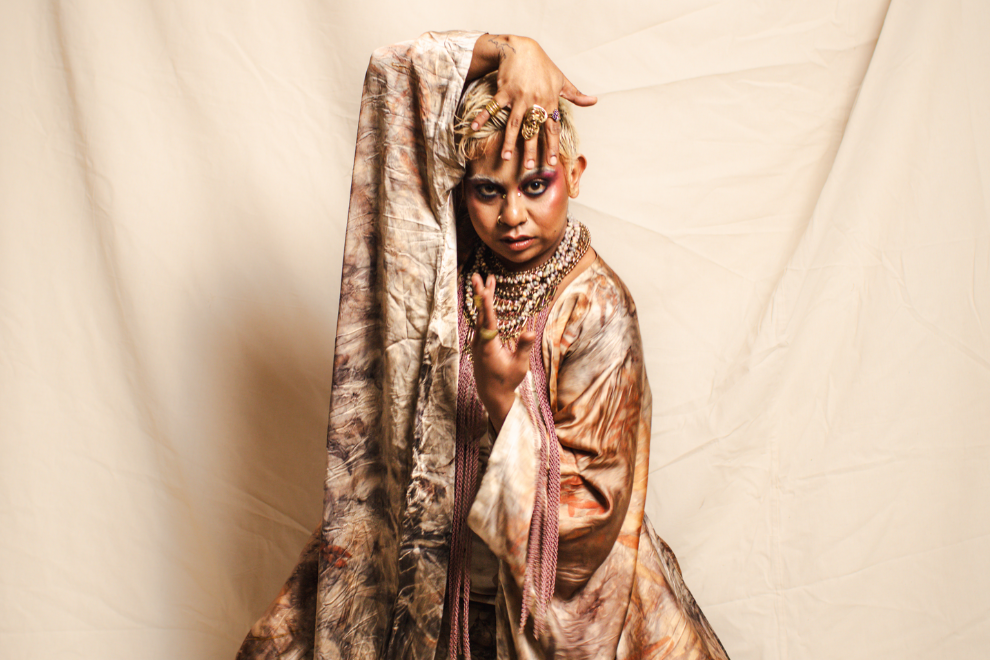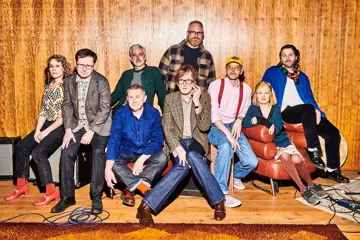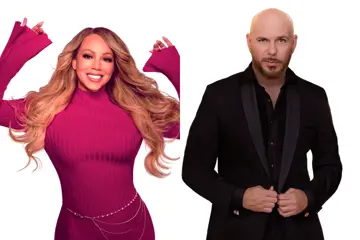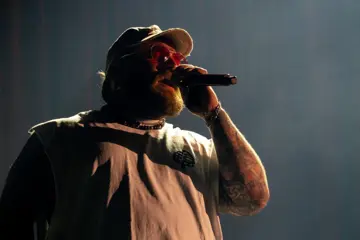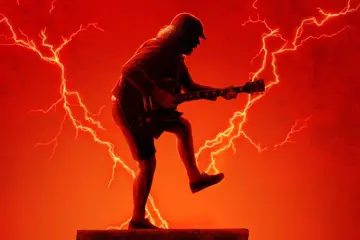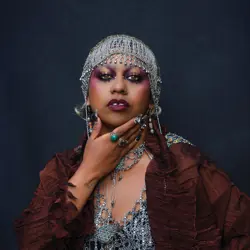 Emily Wurramara
Emily WurramaraCONTENT WARNING: The following article contains mentions of suicide and alcohol abuse. Additionally, Aboriginal and Torres Strait Islander readers are advised that this article may contain the names of deceased people.
It’s been a decent while since Emily Wurramara leapt into the spotlight with her folky debut album, Milyakburra, in ye olden days of June 2018.
The release catapulted Wurramara to dazzling heights – she won an AIR Award and two QMAs, toured everywhere from Sydney to Sweden and sunny New Orleans, and shared formative moments with icons like Missy Higgins, Midnight Oil and the late, great Archie Roach – but it wasn’t all smooth sailing for the Anindilyakwa singer-songwriter: in May 2019, for example, her Meanjin/Brisbane home and belongings were taken by a fire. Behind the scenes, Wurramara was navigating a wild onslaught of ups and downs: she battled alcoholism and attempted suicide, but she also gave birth to a beautiful baby girl, Kiki, and built a new life for her family in lutruwita/Tasmania.
Six years on from Milyakburra, Wurramara has evolved – personally and artistically – into a whole new woman. Her journey to the forefront was chronicled over 12 poignant and powerful songs, which she'll release on August 23 as NARA. The title translates to ‘nothing’ in the Anindilyakwa language, and is deeply sentimental for Wurramara: “My mum tattooed it on me after the house fire,” she chuckles over Zoom. “My people are from Groote Eylandt and Bickerton Island in the Gulf of Carpentaria, and when we use the word ‘nara’, we don’t say it like narra, we go nah-raaah; there’s an emphasis to it. You get the feeling that it’s heavy – like, ‘Oh shit, you’ve actually got nothing.’”
It may seem macabre, given disaster had just robbed Wurramara of her home and life as she knew it – but as the artist explains, the sentiment is laced with sage irony and optimism: “After we lost the house, when I was watching everything burn from across the road, I had this moment where it was like... It kind of felt like a release, you know? I just stood there thinking, ‘Wow, everything I’ve gathered over the last 23 years is burning before my eyes.’ And then I though, ‘Shit, did I sing this into existence?’ Because one of my earliest songs is called Black Smoke – and there I was, watching my home turn into black smoke.
“The point of realisation hit me at my sister’s house later on the same day – I was sitting around with my family and I just kind of thought, ‘Well, okay... I’ve got nothing, but I’ve got everything right here with me.’ My daughter was safe. I was safe. My mum, my brother, the people I love, the people who lived in those flats – they were all safe. I just had a moment of clarity, where I realised the world is just so huge – it’s so much bigger than just my home – and what we’re doing with our existence now is going to echo into the future. And that is so important. It’s so crucial that we understand how our actions and the way we live – the way we move and communicate with each other – is going to ripple on for generations.
“That moment really made me reflect on who I was – what kind of human being I wanted to be – and how even though I had nothing, I still had everything. It made me reorganise my priorities and what I thought was important in my life.”
That moment sparked the ethos of NARA, but the album itself is some 13 years in the making – lead single Magic Woman Dancing, for example, dates back to Wurramara’s high school days. The past six years have been tumultuous, to say the least, but to make sense of it all, she had to zoom out way further. “There were a lot of times where I had to go back in time to understand the here-and-now,” she reflects. “As a songwriter, you know, you’re ever-changing and ever-evolving, and that goes hand-in-hand with life [away from music].
“[In writing for NARA] I felt like I had to try and understand my trauma; I had to feel uncomfortable for a bit [so I could] forgive myself and learn to love myself in this new light. Because I wanted my songs to reflect the different stages of the grief I was experiencing, or the different parts of the joy – whatever was happening at that time... And there was a lot. It was what I to call ‘beautiful chaos’ – where there’s just shit flying everywhere and you never know what’s going to happen – and as a songwriter, I really wanted to showcase all of it. I wanted to show that I can write about whatever I want.”
With that came a defiant resolve to be unconditionally candid with her songwriting. NARA features soul-baring tracks about incredibly dark and personal topics – the kind most other artists would only dare broach if they were camouflaged in metaphors – and Wurramara feels so confident in them, one was recently shared as the album’s second single. Midnight Blues is perhaps the most heartrending track on NARA, reflecting on one of the hardest years the artist has ever lived through. She opened up in a statement shared alongside its release: ���2017 was a big year for me. I had Kiki, I tried to commit twice that year, I drunk myself silly, I had bad postpartum and was trying to be a mum and a good person.”
All her bottled up emotions came to a head on New Year’s Day, right after she’d danced her heart out to Electric Fields’ set at the Woodford Folk Festival. She was there with her mum, fellow artists Shellie Morris and Toni Childs, and “a couple of other friends”. It had been a long night and Wurramara was exhausted, so when she “got separated from the crew and ended up down at the lake”, she found herself at a breaking point. “I sat there and cried my eyes out,” she continued. “There was this fulla who came up wearing this weird looking octopus hat and bright flowy clothes. He asked me if I was alright and I turned around and reckoned, ‘Oh you know brother, midnight blues.’”
The song was written that same night – Wurramara “laid down these keys on GarageBand, just pressed record and sang whatever came out” – and the lyrics you hear on the record are the exact same as the ones she poured out in that moment. “It's a reflection on my life, my truth [and] my pain,” she added. “The phrase, ‘Singing with me, perplexing me with this tune’ implies that the blues is both comforting and confusing at the same time; things are happening within you and around you, immersed in your emotions, perhaps finding solace in music, but also struggling to understand the source or meaning of your own feelings – how growing is uncomfortable but living your freedom is worth that.”
Its inclusion on NARA was non-negotiable. In her statement, Wurramara said she felt it was important to release Midnight Blues because “it’s precious to show people why this life is beautiful and worth sticking around for; being vulnerable in itself has so much strength and staunchness. I want to help people to release, cry, and let it out – this is normal because we live in a fucked up society. Of course we feel shit – I want Midnight Blues to be a safe space to feel. I look at Kiki and think, ‘How can I make this place better, safe, and peaceful?’”
Returning to our own conversation, Wurramara concedes she felt “so nervous” ahead of the single’s release. “It can be shit-scary [to be so vulnerable in the public eye],” she quips. “But then a piece of me was like, ‘You can finally let go [of the trauma behind Midnight Blues] because now it’s going to help the people who need to hear it.’
“You know, I always talk about this balance [between] dark and light: you need this balance to really understand what you’re going through, and I feel that for sure [in opening up] – it is empowering and it is scary and it is beautiful. And I’m growing from it, too – from these experiences, and from hearing people’s feedback and their own stories, and their journeys through these things that I’ve spoken about through my songs. It makes me feel like I’m doing something amazing. It’s really beautiful.”
Wurramara further expounds on her artistic philosophy: “I feel like there's this rawness and realness and authenticity that comes with songwriting. You're allowing yourself the freedom to voice yourself and be truly vulnerable. I think we often deny ourselves our own voices when we’re speaking about our experiences – we condition ourselves to minimise, or repress... So I think trying to write in that way – embodying your vulnerability and [embracing] the freedom in it – it is a challenge, but it’s also liberating. It’s like, ‘Well, I don’t really give a fuck.’ If people don’t like [a song], they don’t like it – and that’s cool. But it’s not because of my projecting, it’s their own shit. And that’s amazing because it means they’re thinking about it; they’re like, ‘Oh, I’m uncomfortable with this,’ or, ‘Oh, this struck a nerve.’ And if that’s the case, well, you’ve got to think about it and work through that shit.”
It all links back to Wurramara’s deeply spiritual relationship with music; she uses songwriting as a tool to connect with the world in unique ways – it helps her make sense of the things that confuse her, process trauma and reckon with grief, and strengthen the bond she has with her ancestry and the world around her. “I write from a really deep place within myself,” she says, “but externally too – I need to be outside when I’m writing songs. I’m a very nature-based songwriter; my inspiration always comes from the sea, the earth, the sky... I feel like that’s always been a part of it.
“I think it very much influences my songwriting in a way where I can create, like, a portal to another world. I’m a little sci-fi fantasy nerd – I love portals and different worlds and mythologies and things like that. [As a songwriter] I try to create another world for the listener to go to when they’re listening to a song, where they can let go and just escape for a little bit – like when you're reading a book, you know? Sometimes I feel like I’m a conduit, and when I’m singing I’m casting a spell to the people who are listening.”
While NARA will transport listeners to all manner of musical worlds, Wurramara found it crucial to stay grounded in her own – so much so, she trekked out to Larrakia country (Darwin), where she was born, to bring all the songs together. She spent three weeks holed up at Boat Ramp Studios with co-producer Kuya James (aka James Mangohig, best known for his work with the likes of A.B. Original and Daniel Johns), eating, sleeping and breathing NARA. She declares: “This album is like my rebirth into the music industry, so it kind of felt right that I went to the place of my birth to create it."
NARA is a family affair, too, with relatives regularly popping in and out of the studio throughout the creative process – her little brother Arringarri even makes his musical debut with a guest spot on the track STFAFM. Midnight Blues has been described as a tribute to her mum – “If it wouldn’t be for [my mum] being there every step of the way, I don’t think I’d be here, to be honest” – who also appears alongside Wurramara’s cousins in the music video for her latest single, Lordy Lordy (which itself features Tasman Keith).
“Whoever was in the room,” she says, “I’d be like, ‘Jump on this track! Sing this!’ You know, it was very much a community-driven record. And I think that really comes through when you listen to the whole record – there's just this feeling of connection to it.”
In addition to Arringarri and Tasman Keith, NARA features guest spots from Velvet Trip’s Zeppelin Hamilton (who sings on the silky slow-burner WWGBH) and one of Wurramara’s biggest teen icons, Lisa Mitchell (whose honeyed melodies bless the blissful See Me There). Wurramara says their place on the record speaks to her “appreciation for creativity”, driven by determination to centre voices that are “fearless with their attitude and belief”. Ultimately, she wanted to create a safe space for those voices to flourish and thrive in new ways; she explains, “For artists and creatives all across the industry, it’s hard to feel like you can be safe – so we have to set an example and take that onboard ourselves, to create safe spaces [for us] to make art in a way that is true to ourselves.”
The sentiment brings us full-circle, back to Wurramara’s philosophy that what you do today will echo on for generations: “Our future generations are so crucial,” she says, the passion palpable in how she emphasises, “I want to be able to create a safe space for them to come in and explore their own creativity, and have fun, and just do what they love.”
Now an established figure in the Australian music industry – and a self-made woman shaped by a life of drastic peaks and valleys, daughter by her side – Wurramara stands tall as a leader for those just starting to cut their own teeth. She admits she tends to “get really emotional” when she thinks about it, because art for her is “not just about me – it’s something I will leave behind for my daughter one day.” She reflects on the women who guided her throughout her own formative years – “Shelly Morris, Emma Donovan... all these amazing, beautiful, strong Blak women who exist in this space” – whose morals and character, she says, “set the standard for what this community really is”.
“We’re just doing what is embedded in us internally," she continues. "It’s part of our law, ancestrally, to pass on our knowledge and make that space for the [generations] after us – to continue telling the stories that our ancestors have told for 65,000-plus years. These different phases of our lives, these portals that we take people through – they’re not just portals of physical existence, there’s this emotional depth that I can't really explain; but we have to keep them going.
“When people come up to me and say they connect with my music, or that I’m an inspiration to them, I kind of freak out a little bit. I’m just like, ‘What the fuck? I like your music too!’ I find that when artists are fans of other artists, and you see them lose their shit over the artists they’re into, that’s when you know they’re a real one – they’re doing it for the right reasons, you know? That’s the heart and soul of it. And I think it’s really beautiful when we’re able to create these spaces where we can cheer each other on like that.”
Emily Wurramara’s new album NARA is out August 23 via ABC Music.
Head here to secure your copy.
If you or someone you know is suffering from depression, anxiety, suicidal thoughts or other mental illness, we implore you to get in contact with Beyond Blue or Lifeline:
Beyondblue: 1300 224 636
Lifeline: 13 11 14
Suicide Call-Back Service: 1300 659 467
Beyond Blue and Lifeline both also offer online chat/counsel. Check their respective websites for operational hours and details.

